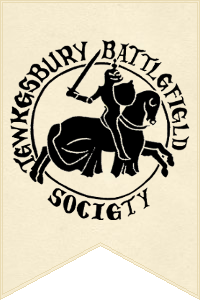March 22nd 1471: Stirrings in the Midlands
Sir William Lord Hastings’ Banner
The symbol is a Maunch; a highly stylised sleeve with a pocket for a prayer book
(The Street Banners of Tewkesbury)
Lord William Hastings was a loyal friend of Edward, despite the family problems his marriage to Warwick the Kingmaker’s sister must have caused when Warwick rebelled and then invaded. He has been at Edward’s side throughout the troubles. His intervention at Mortimer’s Cross, in 1461 had been a turning point which brought victory to Edward. Soon afterwards, after the Battle of Towton he was knighted. In quick succession he was made Lord Chamberlain and elevated to the Peerage. He became the most powerful man in Leicestershire.
Hastings had fled to Flanders with Edward and returned with him to Yorkshire. It isn’t clear if he marched south with Edward or, more likely, left his side to ride to the midlands to raise support. However he did it, many eloquent and persuasive letters must have been written to his retainers and supporters, and a point of rendezvous agreed.
Whilst none of Hastings’ letters seem to have survived, there is an interesting, but then commonplace, contract from 1475, a little after this campaign, which has. An indenture with John Gryffyne, gentleman, for a knight’s service explains some of the conditions: “the said John is retained and withholden with the said Lord Hastings to do him service of war with the King our sovereign lord, ……. for one whole year at his spear well and sufficiently horsed, armed, and arrayed as it apperteneth to a man of arms, and iiii archers well and sufficiently horsed, harnessed, habilled (dressed), and arrayed as it apperteneth to an archer, taking for himself xviii d. a day, and for every archer vi d. by the day, of the which wages the said John hath received the first quarter of the said hole year the day of sealing these presents, at which day the said lord hath yeven (given) knowledge to the said John that he shall make monstres (musters) of himself and his said retinue, at Portesdown in Hampshire, the xxiiiith day of May next commencing, or the same day at any other place upon reasonable warning."
Meanwhile. Warwick’s supporters were also active in the area. The Earl of Oxford had moved from East Anglia with William, Lord Beaumont and the Duke of Exeter (who had ignored his promise to the Duke of Burgundy not to fight for Warwick). They waited in Newark. The Marquis of Montagu’s forces were moving south from Pontefract and Warwick was travelling north. There were lots of soldiers on the move, and the advantage looked to be with the Lancastrians if they could co-ordinate their movements.

